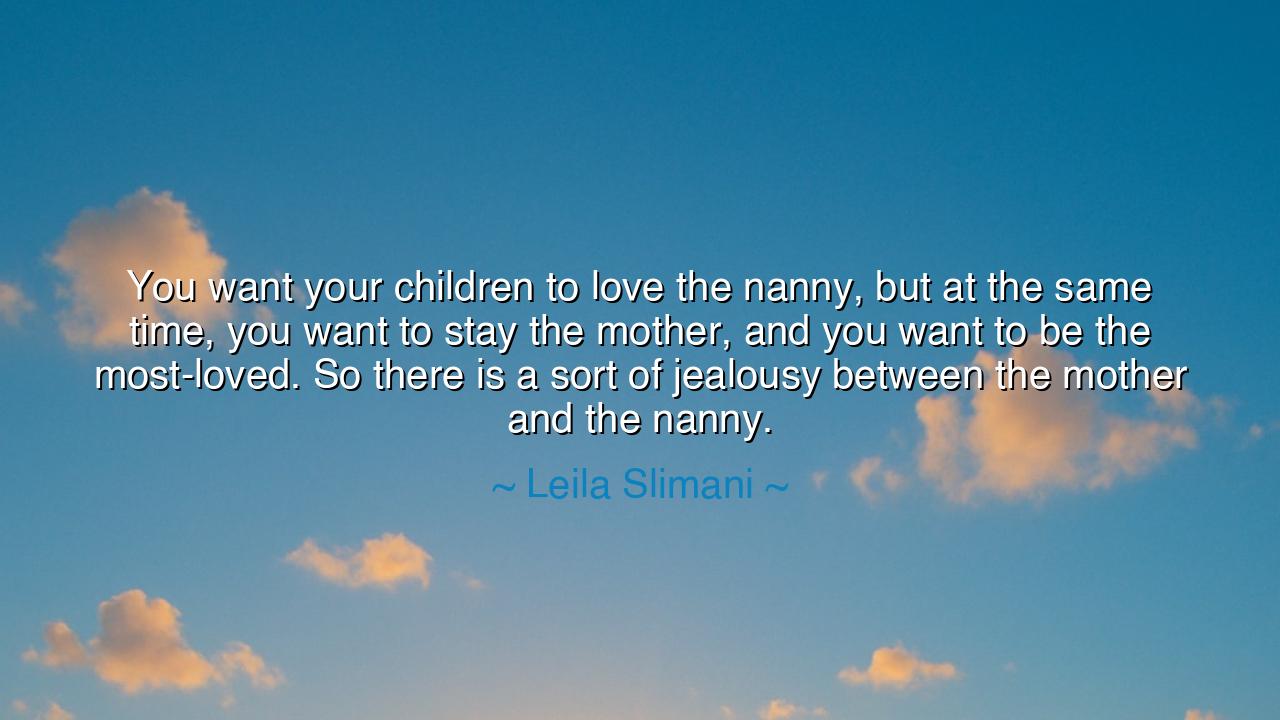
You want your children to love the nanny, but at the same time
You want your children to love the nanny, but at the same time, you want to stay the mother, and you want to be the most-loved. So there is a sort of jealousy between the mother and the nanny.






“You want your children to love the nanny, but at the same time, you want to stay the mother, and you want to be the most-loved. So there is a sort of jealousy between the mother and the nanny.” Thus spoke Leila Slimani, the novelist whose stories pierce the hidden tensions of family life. In these words, she lays bare a paradox that has existed wherever one woman has entrusted another with the care of her child: the conflict between gratitude and rivalry, between trust and fear, between the desire to share responsibility and the instinct to remain supreme in a child’s heart.
The meaning of this saying is profound. To be a mother is to yearn for one’s child to be safe, cared for, and surrounded by love. Yet to entrust a nanny with that role awakens a delicate tension. On the one hand, the mother wants her child to embrace the nanny, for only through affection can true care be given. On the other hand, there rises a shadow of jealousy, for the child’s love feels divided, and the mother fears that her unique place may be threatened. Slimani does not condemn this jealousy—she names it, acknowledges it as natural, born of the deepest human longing: the desire to remain irreplaceable in the heart of one’s own child.
The ancients too knew of such tensions. In the myths of Greece, the child Telemachus was nursed by servants and attendants in Odysseus’ long absence. They loved him as their own, yet Penelope remained his mother, bound by a fear that others might usurp her place in his affections. In royal courts across history, wet nurses and governesses were trusted with children of kings, often becoming beloved figures, even as mothers wrestled with both relief and rivalry. The tension Slimani describes is not new—it is as old as the sharing of maternal duty.
History offers us a vivid example in the life of Queen Victoria. Though she bore many children, she often entrusted them to governesses and attendants. These caretakers were adored by the children, sometimes more than the queen herself, who was stern and distant. Letters and diaries reveal the unspoken rivalry, the queen’s subtle resentment of the bond between her children and their governesses. Thus Slimani’s words echo truth across centuries: the love of a child, when shared, can become both blessing and torment to a mother’s heart.
Yet Slimani’s insight is also tender. She recognizes that this jealousy is not born of malice but of vulnerability. The mother’s desire to be the “most-loved” is not selfishness alone—it is the cry of her heart to remain central in the story of her child’s life. But wisdom demands balance. A mother must learn to accept the love her child gives to others, to see that affection is not a pie divided into shrinking slices, but a flame that multiplies as it spreads. To rejoice in the child’s love for the nanny is not to lose one’s place, but to strengthen the child’s capacity to love abundantly.
The lesson for us is this: beware of envy when love is shared. Parents, remember that a child who loves others does not love you less. Love is not diminished by sharing—it is enlarged. To resent another’s place in your child’s heart is to plant seeds of bitterness, but to rejoice in it is to create a garden of security, where the child grows in trust, confidence, and joy. The nanny may be loved, but the mother remains mother, irreplaceable, eternal in the heart of her child.
So let Slimani’s words be a mirror for us all: “There is a sort of jealousy between the mother and the nanny.” Recognize it, but do not be ruled by it. Let love be a river, flowing wide enough to carry many, without fear of scarcity. For in the end, what matters most is not being the “most-loved,” but ensuring the child is most loved—surrounded by devotion, strengthened by bonds, and raised in a world where love is abundant, not withheld. In this lies the victory of motherhood, and the true inheritance of the child.






AAdministratorAdministrator
Welcome, honored guests. Please leave a comment, we will respond soon